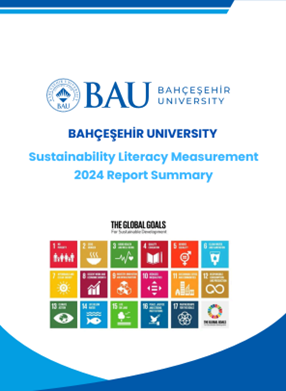The image below shows the cover page of the Bahcesehir University Sustainability Literacy Measurement Report.

Since 2021, Bahcesehir University (BAU) has been regularly conducting the Sustainability Literacy Survey to evaluate students’ knowledge, attitudes, and awareness regarding sustainability.
The survey assesses students’ familiarity with the United Nations Sustainable Development Goals (SDGs), their personal sustainability practices, and their awareness of BAU’s sustainability-related initiatives. Results from these annual surveys help refine the university’s academic programs and projects, strengthening its long-term commitment to sustainability and creating a positive impact within and beyond the campus community.
In 2024, Bahcesehir University once again conducted the Sustainability Literacy Survey to measure students’ familiarity with sustainability concepts, sustainable habits, and perceptions of the university’s sustainability practices. The findings reveal a steady increase in sustainability literacy and awareness among students, reflecting the growing effectiveness of BAU’s sustainability-driven education and campus operations.
2024 Results Summary
Familiarity with Sustainability Concepts:
84% of students reported being familiar with the concept of sustainability, up from 79% in 2023, showing a clear rise in awareness and understanding.
Understanding of the SDGs:
47% of students stated they know what the SDGs are (up from 41% in 2023), while 33% had heard of them but were not fully familiar (down from 36%), and 20% had not heard of them before (down from 33%). These figures indicate growing visibility of SDG-related knowledge at BAU.
Scope of Sustainability:
50% of respondents associated sustainability with environmental issues, while 38% correctly recognized it as encompassing environmental, social, and economic dimensions (up from 31% in 2023).
Definition of Sustainable Development:
78% correctly defined sustainable development as “meeting the needs of today without compromising the ability of future generations to meet their own needs,” up from 74% in 2023.
Recycling Habits:
63% of students reported recycling materials such as plastic, paper, and metal, a slight increase from 59% in 2023.
Use of Refillable Water Bottles:
44% of respondents used refillable bottles (up from 39% in 2023), showing growing eco-conscious behavior.
Environmentally Aware Transportation Choices:
69% of students reported considering the environmental impact of their transportation choices at least occasionally, up from 62% in 2023.
Knowledge of Renewable Energy:
52% correctly identified renewable energy sources such as solar and wind (up from 47% in 2023), reflecting improving environmental literacy.
Carbon Footprint Awareness:
54% of respondents correctly defined a carbon footprint (up from 48% in 2023), showing positive growth in environmental understanding.
Economic Sustainability:
63% defined it as “long-term profitability that considers employee well-being and resource efficiency,” up from 59% in 2023.
Social Sustainability:
99% recognized “economic profit maximization” as not being a principle of social sustainability, maintaining high awareness levels from 2023.
Ethical Labor Awareness:
99% identified “fair wage policies for employees” as a key step toward social sustainability, showing strong awareness of ethical labor practices.
Knowledge of SDGs by Theme:
Highest familiarity was with Climate Action (4.6/5), Gender Equality (4.3/5), and Reduced Inequalities (4.1/5). Lower familiarity was reported for Life Below Water (2.3/5) and Life on Land (2.5/5), indicating room for growth in environmental topics.
Sources of Sustainability Knowledge:
Students cited courses (76%), BAU communication channels (63%), and campus initiatives (42%) as their main sources—showing consistent institutional engagement.
Perceived Importance and BAU’s Leadership Role:
Students rated sustainability importance higher after joining BAU, rising from 1.7 (pre-enrollment) to 4.3. Perception of BAU’s leadership in sustainability also increased from 3.9 to 4.2.
Agreement on BAU’s Sustainability Efforts:
4.4 out of 5 students agreed that BAU applies effective sustainability practices (up from 4.2), and 4.6 out of 5 agreed that BAU offers sufficient learning opportunities on sustainability (up from 4.5).
Conclusion:
The 2024 Sustainability Literacy Survey confirms that BAU students’ sustainability awareness continues to grow annually. The data highlights progress in environmental and social understanding, behavioral changes, and participation in sustainability initiatives. BAU’s integrated approach—embedding sustainability into education, campus life, and institutional policy—continues to nurture a community of informed, responsible, and proactive individuals who contribute to a more sustainable future.